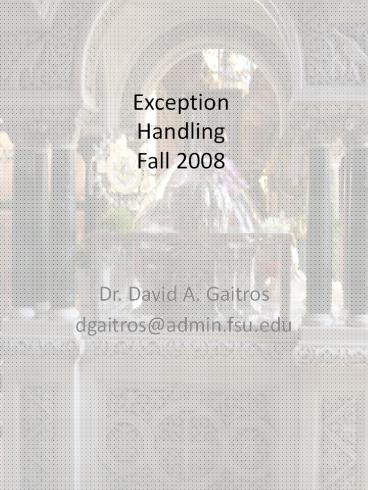Exception%20Handling%20Fall%202008 PowerPoint PPT Presentation
Title: Exception%20Handling%20Fall%202008
1
Exception HandlingFall 2008
- Dr. David A. Gaitros
- dgaitros_at_admin.fsu.edu
2
Exception Handling
- A well behaved program never abnormally
terminates. All errors or problems should be
handled by the program - Exception A problem that occurs that is outside
the normal expected behavior of the system.
Example Divide by zero
3
Exception Handling
- Most exceptions are infrequent or should not
happen at all. - The code for the exception should be separated
from the main body to avoid confusing maintenance
activities. - Harkins back to the day of the go to when the
execution path of computer programs was less well
behaved.
4
Exception Handling
- Exception handling best used for situations that
would normally cause the program to abnormally
terminate or produce unpredictable results - Divide by Zero
- Array subscript out of bounds
- Register or number overflow or underflow
- Stack overflow or underflow
- Abnormal operation
- Parity error
5
Simple Example
- include ltiostreamgt
- using namespace std
- int main()
- int cookies, people
- double cpp
- try
- cout ltlt "Enter number of people "
- cin gtgt people
- cout ltlt "Enter number of cookies "
- cin gtgt cookies
- if (cookies 0) throw people
- else if (cookies lt 0)
- throw static_castltdoublegt(people)
- cpp okies/static_castltdoublegt(people)
- cout ltlt cookies ltlt " cookies.\n"
- ltlt people ltlt " people.\n"
- ltlt "You have " ltlt cpp
- ltlt " cookies per person.\n"
6
- catch(int e)
- cout ltlt e ltlt " people, and no cookies!\nGo buy
some cookies!\n" - catch(double t)
- cout ltlt "Second catch block type double -- do we
reach it?\n" - cout ltlt "End of program.\n" return 0
7
try Block
- The basic handling of an exception consists of
the try-throw-catch trio. - Basic try block
- try
- // Some code goes here
- // Possibly throw an exception
- // More regular code can go here.
8
try Block
- The try block is a method of grouping code
together that could be associated with one or
more exceptions and note affecting the rest of
the program. - If an exception is detected, the alternative code
is executed while the execution of the normal
code within the try block is halted. - The code after the try block is not affected.
- If an exception occurs within a try block, the
try block ends and the program attempts to match
the exception with one of the catch handlers. - If match found, code in catch is executed
- Only one catch block will be executed
- Execution resumes after last catch block
9
Example try-catch
- try
- if(Array_Index gt 100)
- throw Array_Index
- catch ( int e)
- cout ltlt eltlt is greater than 100ltlt
- ltlt resetting index to 100\n
- Array_Index 100
10
Overuse of Exceptions
- Exceptions alter flow of control
- Similar to old "goto" construct
- "Unrestricted" flow of control
- Should be used sparingly
- Good rule
- If desire a "throw" consider how to write
program without throw - Ask yourself how often you expect to encounter
this error - Errors caused by bad user input is usually not a
reason to write an exception to handle it - If alternative reasonable ? do it

